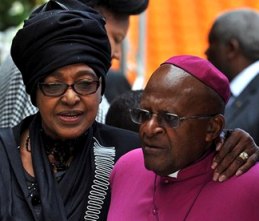Dec. 17 (GIN) – Archbishop Desmond Tutu, an activist in the anti-apartheid struggle, said he was dismayed at the “blatant exclusion” of Afrikaners from last week’s memorial services for Nelson Mandela.
He noted the absence of the Dutch Reformed Church and the limited use of the Afrikaans language at the services.
It was a mainly Afrikaner party that introduced white minority rule, which Mr Mandela opposed. But after becoming South Africa’s first black president, Mr Mandela preached reconciliation with his former enemies.
“We were amiss in not being as inclusive as Madiba would certainly have been,” Tutu said. “To the extent that I can do so meaningfully, I apologize to our sisters and brothers in the Afrikaner Community.”
The Archbishop also criticized the prominence of the governing African National Congress during the week of events following Mr Mandela’s death on Dec. 5. “It may have sent out a more inclusive message,” he said, “had the program directors at the Memorial and Funeral – both national and State events – not both been senior office-bearers of the ruling party.”
Meanwhile, in Ventersdorp, a former Afrikaner stronghold, grieving for the former anti-racist fighter was observed among some Afrikaner whites
At the Dutch Reformed Church on Cochrane Street, a BBC reporter said he watched the old and the young stand in silence to remember Mr Mandela.
The pastor, Gerrit Strydom, had served as a soldier patrolling the black townships during the violence of the transition years.
“The Dutch Reformed Church provided a religious justification for apartheid,” recalled reporter Fergal Keane. “Its ministers once preached that blacks were inferior beings, the “hewers of wood and drawers of water” of the Book of Joshua in the Old Testament.
Pastor Strydom now believes Mr Mandela taught Afrikaners the value of reconciliation. “After all the years we had him in prison, he could have turned around and made South Africa a bad place for our people. But Nelson Mandela was the one guy who brought people together.”
Anna Johnson, a Black Ventersdorp resident, went further: “What he gave us was beyond what we expected. We were in chains, he freed us. We were blind and he opened our eyes.”















